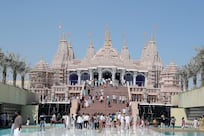ABU DHABI // Every new building in the emirate will have to abide by compulsory unified building codes from early next year.
The codes will result in safer buildings with longer lifespans and will pave the way for a new era of design and construction in the region, industry experts said.
Until now, the Abu Dhabi International Building Code (ADIBC) standards, that are based on those of the International Code Council and customised for the city, have been optional for developers.
But by spring 2014 it will be compulsory that all proposed projects in Abu Dhabi meet the set standards, the Department of Municipal Affairs (DMA), which developed the regulations, said yesterday.
The uniform codes will stop confusion and technical issues caused by the previous system, which worked on a jumble of codes from France, Germany and the United States, among others, said Yasmeen Saadah, the acting division director of municipal regulations at the DMA.
Addressing the 2013 Abu Dhabi Building Codes Forum, she said the new "streamlined" system, now in its final stages, would "unify and regulate the construction industry in Abu Dhabi".
Majid Al Mansouri, chairman of the DMA, said the codes are based on the US-developed International Code Council standards and have been adapted to local needs, such as areas concerning climate and environment. He added that they would be revisited every three years due to the UAE's continually changing urban landscape.
The standards had stalled for two years but received a "good push" early last year when Sheikh Mohammed bin Zayed, Crown Prince of Abu Dhabi and Deputy Supreme Commander of the Armed Forces, urged the DMA to move forward with implementation, said Mr Mansouri.
He added that Sheikh Mohammed hoped the unified building codes would realise the dream of Abu Dhabi being one of the top-five municipalities in the world. "Developers were coming to the UAE and using codes from their own country. We need codes that reflect our own needs," Mr Mansouri said.
Leading developers in the building and construction sector in Abu Dhabi gathered at the 2013 forum at the Saint Regis Hotel, on Saadiyat Island, to speak about the importance of the codes.
Anthony Ray, an architect behind multi-million dirham projects in the capital such as the forthcoming Yas Mall, which follows a recommended preliminary version of the code, said the new ADIBC "will give a consistency and will strengthen the design process and the ability of production and construction".
He added: "It stops the confusion. In the complexity of buildings today, the next generation of codes is required."
Michael Quigley, an architect at KEO International Consultants, also welcomed the development.
He said: "The new codes will mean safer buildings with a longer lifespan and provides clarity and removes ambiguity - we believe this is the start of a new era for building design and construction.
Corina Makhol, sustainability manager at KEO, said that the code creates "a universal language between architects, developers and authorities".
The mandatory implementation of the building codes will be "phase four" of six, the forum heard. Phase five, which will come in 2015, will see the regulation of the system through the DMA, while the sixth phase will be the maintenance of the codes.
Existing buildings will not be affected, but any changes will have to be in line with the code.
[ jbell@thenational.ae ]





